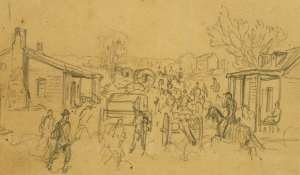Robert Burch on “The Battle of Big Bethel and the Struggle for Control of the Yorktown Peninsula”, Part 2
Nested between the Siege of Fort Sumter and the Battle of First Bull Run (aka First Manassas) during the spring of 1861 is the often overlooked action at Big Bethel church, Virginia, on June 10th, 1861. Many historians and Civil War enthusiasts consider this action the first true battle of the war. Unfolding political and military events quickly turned Virginia into the first active theater of campaigning for Union and Confederate armies. The Yorktown Peninsula soon became the first contested area within that theater. Conceived by local Union Army leaders as raid to stop Confederate pickets from harassing Union troops, Big Bethel instead became the testing ground for two citizen armies that were mustered, equipped, trained, and deployed over a six-week period following Fort Sumter. Union volunteer regiments attacked Confederates led by John Magruder and Daniel Harvey Hill for three hours. What happened that day and its results were the focus of national attention on both sides until Bull Run six weeks later.
To properly place the action at Big Bethel in perspective, the presentation begins by summarizing the political and military events that led a peaceful nation to war. The political factors that caused thousands of volunteers to fight with passion on June 10th are highlighted. Next the military factors that caused Virginia to become the first active theater of operations and Yorktown Peninsula to host the war’s first battle are surveyed. All participating Union and Confederate regiments and their leaders are concisely portrayed. Finally, the aftermath, analysis and significance of the battle are reviewed. The PowerPoint slides document the product of the speaker’s research in great detail. Time allows only a few key points from each slide to be presented. Numerous period photographs and magazine drawings are included for visual effect with the intent of bringing to life the drama and passion of the war’s first test of arms.
Robert Burch graduated from San Jose State University in 1982 with a BA Degree in American history and commissioned through Army R.O.T.C. He retired after a thirty year career with the rank of colonel in 2013. He participated in seven campaigns in three wars as well as graduated from the Army’s Command and General Staff College and the Naval War College. He served as a field artillery battery commander during the 1991 Gulf War and as chief of plans & operations (J7) with United States Forces – Iraq at Bagdad in 2011. His last assignment was as part of the international command team at NATO’s Consolidated Fielding Center in Kabul, Afghanistan responsible for activating new Afghan National Army units. He has been awarded the Bronze Star, Legion of Merit, Joint Meritorious Service Medal, and Army Commendation Medal.
Bob first became interested in the American Civil War in the late 1960s after reading National Geographic centennial articles on Gettysburg and Appomattox campaigns and watching John Ford’s movie The Horse Soldiers staring John Wayne. His interest was further stimulated after receiving as a gift the American Heritage’s Civil War board game. Soon Bob was searching libraries and bookstores for books on the war. Later his formal studies at San Jose History included a course on the war and reconstruction. Over the years he has retraced all campaign routes east of the Mississippi River, including numerous visits to Gettysburg, Chickamauga, and Vicksburg. He also enjoys walking less known sites such as Valverde (NM) or Augusta (GA). Bob joined the San Jose chapter of the Civil War Round Table in 2013.
Bob’s natural focus is the military aspect of the war. He finds this intersects with all other aspects of the war ranging from political to economic to social factors since an army is a reflection of the society that formed and sustained it. Within the military sphere he specializes in command and control of military forces as well as army administration. He and his wife Marina have two daughters, Stephanie and Irine (a graduate of Santa Clara University). They reside in San Jose, California.

